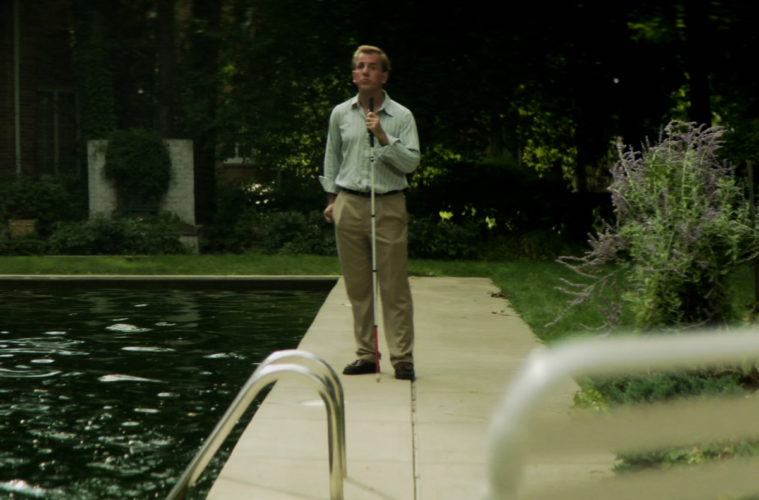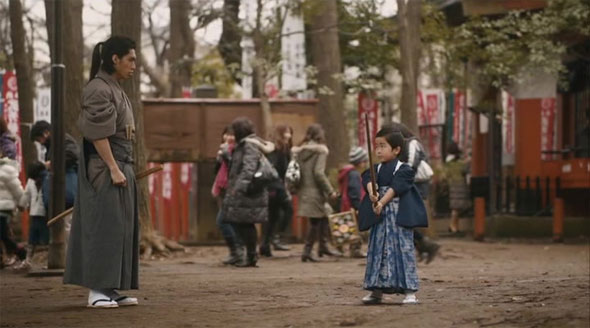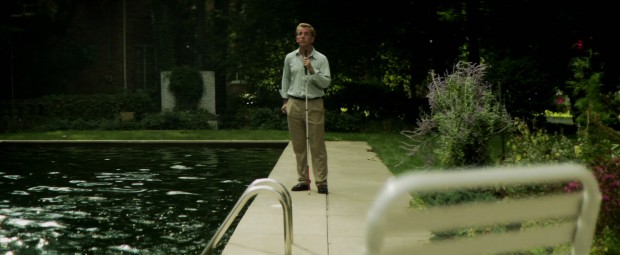Director Yoshihiro Nakamura has gathered a strong following at Fantastic Fest over the last two years. The festival showed Fish Story in 2009 and in 2010, Golden Slumber was one of the most buzzed films coming out of the fest. This year was the highly anticipated A Boy and His Samurai (Chonmage Purin), and it is a remarkably low-key and small-scale film that retains his notable charm. Samurai focuses on Hiroko Yusa and her young son Tomoya in modern day Tokyo. Hiroko struggles to balance work and raising her child by herself when a 19th century samurai is transported into their world and changes everything. Kijima Yasube finds the 21st century difficult to adjust to as any person would, and over the course of 108 minutes we are treated to the expected hijinks—including Kijima struggling to learn how to play Pokemon—pulled off with absolute charm.
Initially, Kijima is shocked to find the independence of Hiroko, as his time period had women doing only household chores in a male-dominated society. Instead of Kijima simply focusing on trying to get back to his time, he decides to repay Hiroko for room and board by doing domestic chores and helping to rear Tomoya. You see, his samurai teachings easily transition to doing chores like cleaning and washing clothes, and he becomes intensely focused on completing his tasks to the best of his ability. When he stumbles upon custard, he turns that laser-guided focus on creating extraordinary desserts. This leads to new dynamics entering the relationship and it threatens to tilt the balance of a system that has all three at a happy medium. The film is carefully paced and unfortunately feels longer than it actually is, yet everything is pulled off with so many smirks and snickers that you will be hard-pressed not to fall for the film.
As for Aardvark, this 80-minute romp is a mixed bag of intrigue and frustration. The film centers on the story of a blind recovering alcoholic named Larry who takes up Gracie Jiu-Jitsu from Darren. Both of those roles are played by their real-life inspirations, the blind Larry L. Lewis and GJJ teacher Darren Branch. While the first half retells this miraculous story, the film does eventually twist into a somewhat forced neo-noir where Larry tracks down a few bad guys. This is the directorial debut by cinematographer/actor Kitao Sakurai and we can feel some of the growing pains in the narrative.
Aardvark utilizes long shots, especially in the beginning, to give us a sense of how Larry navigates our world. Everything has a natural flow, and when Larry bumps his head on a stairwell, it isn’t because he is acting. Instead of staying on course as a biopic, there is a narrative redirection when Larry is briefly introduced to the troubles Darren has behind the scenes and discovers the secret crime world of Cleveland, Ohio. This is when we are introduced to the foul-mouthed and hard-nosed Southern cop who sounds straight out of New Orleans and belongs anywhere but this film. The main characters turn in quality performances, and most potent is the lesson of Jiu-Jitsu that Darren explains to Larry. Yet as a whole the film feels like it missed an opportunity at a brilliant short with a focus on a man that may be disadvantaged but never gives up.



